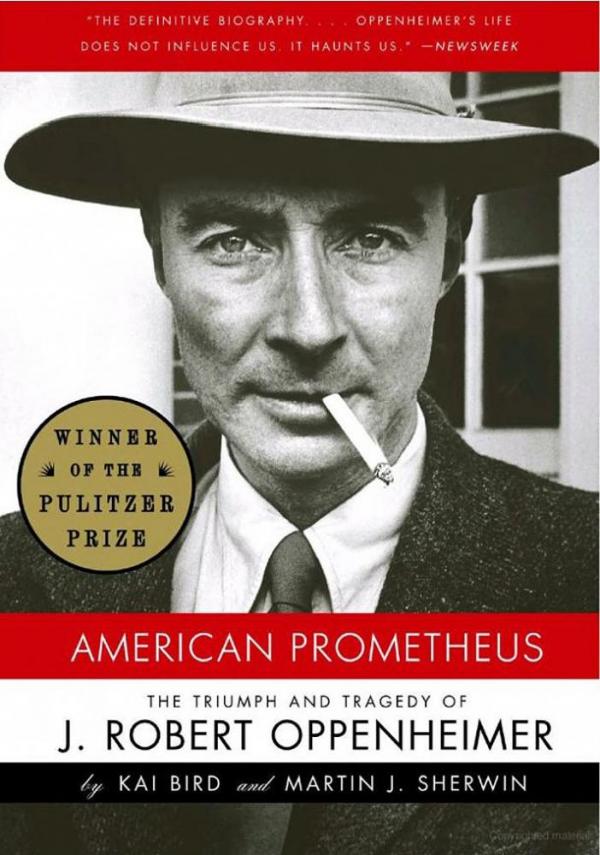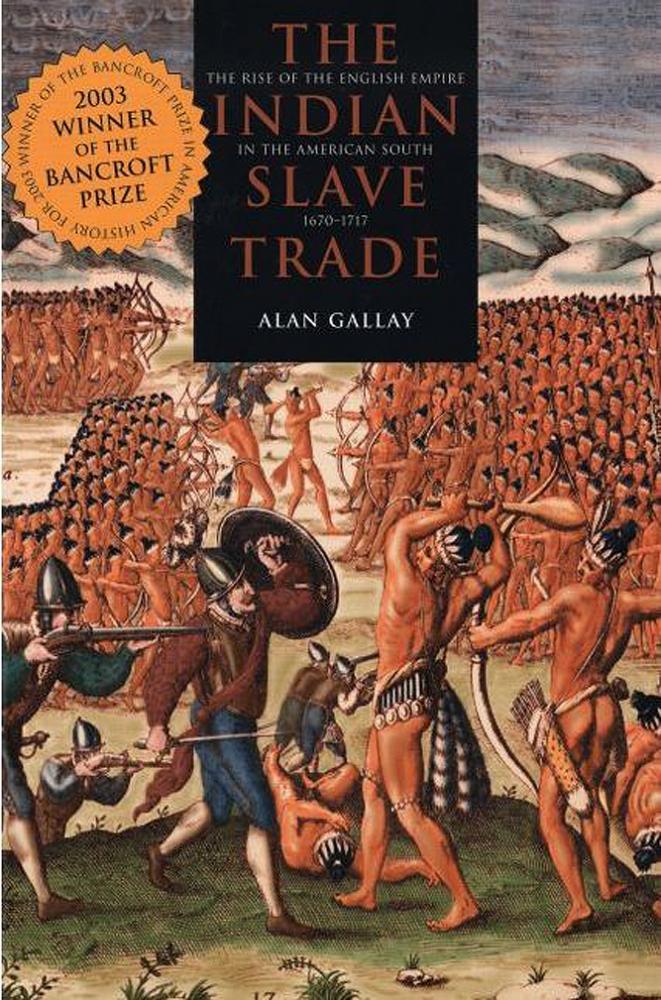
American Prometheus
Credit: Vintage Books

American Prometheus
Credit: Vintage Books
One of the Endowment's essential functions is to encourage the creation of books that provide the American public with invaluable perspective on our nation and its culture, and that have a potentially transformative effect on their respective fields. Dozens of authors supported by NEH have won major prizes and profoundly influenced the way we understand history, politics, literature and society. Listed below are volumes honored by the Pulitzer Prize and/or the Bancroft Prize, two of the nation’s most prestigious books awards.
In addition, many other NEH-funded scholars have produced works that have drawn international attention and had substantial impact, recently including the definitive edition of the Autobiography of Mark Twain (2010), Margaret Washington's Sojourner Truth's America (2009), The Letters of Samuel Beckett, 1929-1940, edited by Martha Dow Fehsenfeld and Lois More Overbeck (2009), Richard R. John's Network Nation (2010), and Melvin I. Urofsky's Louis D. Brandeis: A Life (2009), to cite only a few.
Still more distinguished authors have been recognized in receiving the National Humanities Medal, such as 2009 awardee Annette Gordon-Reed, who wrote The Hemingses of Monticello and Thomas Jefferson and Sally Hemings: An American Controversy.
2006 Pulitzer Prize in Biography
Kai Bird and Martin J. Sherwin, American Prometheus: The Triumph and Tragedy of J. Robert Oppenheimer (Knopf, 2005). “ . . . a standout in two genres: biography and social history.” – San Francisco Chronicle
2004 Pulitzer Prize in History
Steven Hahn, A Nation Under Our Feet: Black Political Struggles in the Rural South from Slavery to the Great Migration (Belknap Press, 2003). “… ambitious and fascinating” – The New Yorker
2004 Pulitzer Prize in Biography
William Taubman, Khrushchev: The Man and His Era (W. W. Norton, 2003). “ . . . shines with mastery and authority.” – New York Times Book Review
2003 Bancroft Prize
Alan Gallay, The Indian Slave Trade: The Rise of the English Empire in the American South, 1670-1717 (Yale University Press, 2002). “A majestic volume . . . [that] will reshape our understanding . . . of the colonial South . . . ” – Georgia Historical Quarterly
2003 Bancroft Prize
James F. Brooks, Captives and Cousins: Slavery, Kinship, and Community in the Southwest Borderlands (University of North Carolina Press, 2002).
2002 Pulitzer Prize in History
Louis Menand, The Metaphysical Club: A Story of Ideas in America (Farrar Straus & Giroux, 2001). “Hugely ambitious, unmistakably brilliant” – The New York Times
2001 Bancroft Prize
Susan Lee Johnson, Roaring Camp: The Social World of the California Gold Rush (W. W. Norton, 2000).
2000 Pulitzer Prize for Biography
Stacy Schiff, Vera (Mrs. Vladimir Nabokov) (New York: Random House, 1999).
2000 Pulitzer Prize for History
David M. Kennedy, Freedom from Fear: The American People in Depression and War, 1929-45 (Oxford University Press, 1999). “This is the kind of book prizes are made for.” – Chicago Tribune
2000 Bancroft Prize
James H. Merrell, Into the American Woods: Negotiators on the Pennsylvania Frontier (W.W. Norton, 2000).
1999 Pulitzer Prize in History
Edwin G. Burrows and Mike Wallace, Gotham: A History of New York City to 1898 (Oxford University Press, 1998). “Gotham is a masterwork” – Baltimore Sun
1997 Pulitzer Prize in History
Jack N. Rakove, Original Meanings: Politics and Ideas in the Making of the Constitution (Alfred A. Knopf, 1997).
1997 Bancroft Prize
David E. Kyvig, Explicit and Authentic Acts: Amending the U.S. Constitution, 1776-1995 (University of Kansas Press, 1996).
1996 Pulitzer Prize in History and Bancroft Prize
Alan Taylor, William Cooper's Town: Power and Persuasion on the Frontier of the Early American Republic (Alfred A. Knopf, 1995). “Marvelous . . . Taylor’s intellectual grasp never fails.” –The New Yorker
1996 Bancroft Prize
David S. Reynolds, Walt Whitman's America: A Cultural Biography (Alfred A. Knopf, 1995).
1995 Pulitzer Prize in Biography
Joan D. Hedrick, Harriet Beecher Stowe: A Life (Oxford University Press, 1994). “Intelligent, thoroughly researched . . . .” –The Wall Street Journal
1994 Bancroft Prize
Winthrop D. Jordan, Tumult and Silence at Second Creek: An Inquiry Into a Civil War Slave Conspiracy (Louisiana State University Press, 1993).
1993 Bancroft Prize
Melvyn P. Leffler, A Preponderance of Power: National Security, The Truman Administration, and the Cold War (Stanford University Press, 1992).
1991 Bancroft Prize
Lizabeth Cohen, Making a New Deal: Industrial Workers in Chicago, 1919-1939 (Cambridge University Press, 1990). “This is an impressive and hefty piece of work.” – The Times Education Supplement
1991 Pulitzer Prize in History and 1991 Bancroft Prize
Laurel T. Ulrich, A Midwife's Tale: The Life of Martha Ballard, Based on Her Diary, 1785-1812 (Alfred A. Knopf, 1990). “A major source through which we can vicariously experience the rural life of early New England.” –The New York Times Book Review
1990 Bancroft Prize
Neil R. McMillen, Dark Journey: Black Missisippians in the Age of Jim Crow (University of Illinois Press, 1989).
1989 Pulitzer Prize in History
James M. McPherson, Battle Cry of Freedom: The Civil War Era (Oxford University Press, 1988). “The finest single volume on the war and its background.” – The Washington Post
1989 Bancroft Prize
Eric Foner, Reconstruction: America's Unfinished Revolution, 1863-1877 (Harper and Row, 1988). “This is history written on a grand scale, a masterful treatment . . . .” –The New Republic
1987 Pulitzer Prize in History
Bernard Bailyn, Voyagers to the West: A Passage in the Peopling of America on the Eve of the Revolution (Alfred A. Knopf, 1986). A “superbly documented history” by an “indefatigable historian”—Publishers Weekly
1986 Pulitzer Prize in Biography
Elizabeth Frank, Louise Bogan: A Portrait (Alfred A. Knopf, 1985).
1983 Bancroft Prize
Nicholas A. Salvatore, Eugene V. Debs: Citizen and Socialist (University of Illinois Press, 1982).
1982 Bancroft Prize
Edward Countryman, A People in Revolution: The American Revolution and Political Society in New York, 1760-1790 (The Johns Hopkins University Press, 1981).
1981 Bancroft Prize
Jean Strouse, Alice James: A Biography (Houghton Mifflin Company, 1980).
1980 Bancroft Prize
Robert Dallek, Franklin D. Roosevelt and American Foreign Policy, 1932-1945 (Oxford University Press, 1979). “A dazzling narrative . . . elegant . . . history on the grandest scale . . . .” – New York Times Book Review
1980 Bancroft Prize
Thomas Dublin, Women at Work: The Transformation of Work and Community in Lowell, Massachusetts, 1826-1860 (Columbia University Press, 1979). “. . . a model of social history.” – The Yale Review
1979 Pulitzer Prize in History
Don E. Fehrenbacher, The Dred Scott Case: Its Significance in American Law and Politics (Oxford University Press, 1978). “Probably the most thorough study of any Supreme Court decision ever undertaken.” – New York Review of Books
1979 Pulitzer Prize in Journalism
James Risser, Des Moines Register, seven-part series on agricultural pollution.
1976 Pulitzer Prize in Journalism
James Risser, Des Moines Register, series on corruption in the grain exporting trade.
1976 Bancroft Prize
R.W.B. Lewis, Edith Wharton: A Biography (Harper and Row, 1975).
1975 Pulitzer Prize in History
Dumas Malone, Jefferson and His Time, Volumes I-V (Little, Brown, 1948-75). “[O]ne of the great biographies of the 20th century” – The New Republic
1970 Bancroft Prize
Gordon S. Wood, The Creation of the American Republic, 1776-1787 (University of North Carolina Press, 1969).

